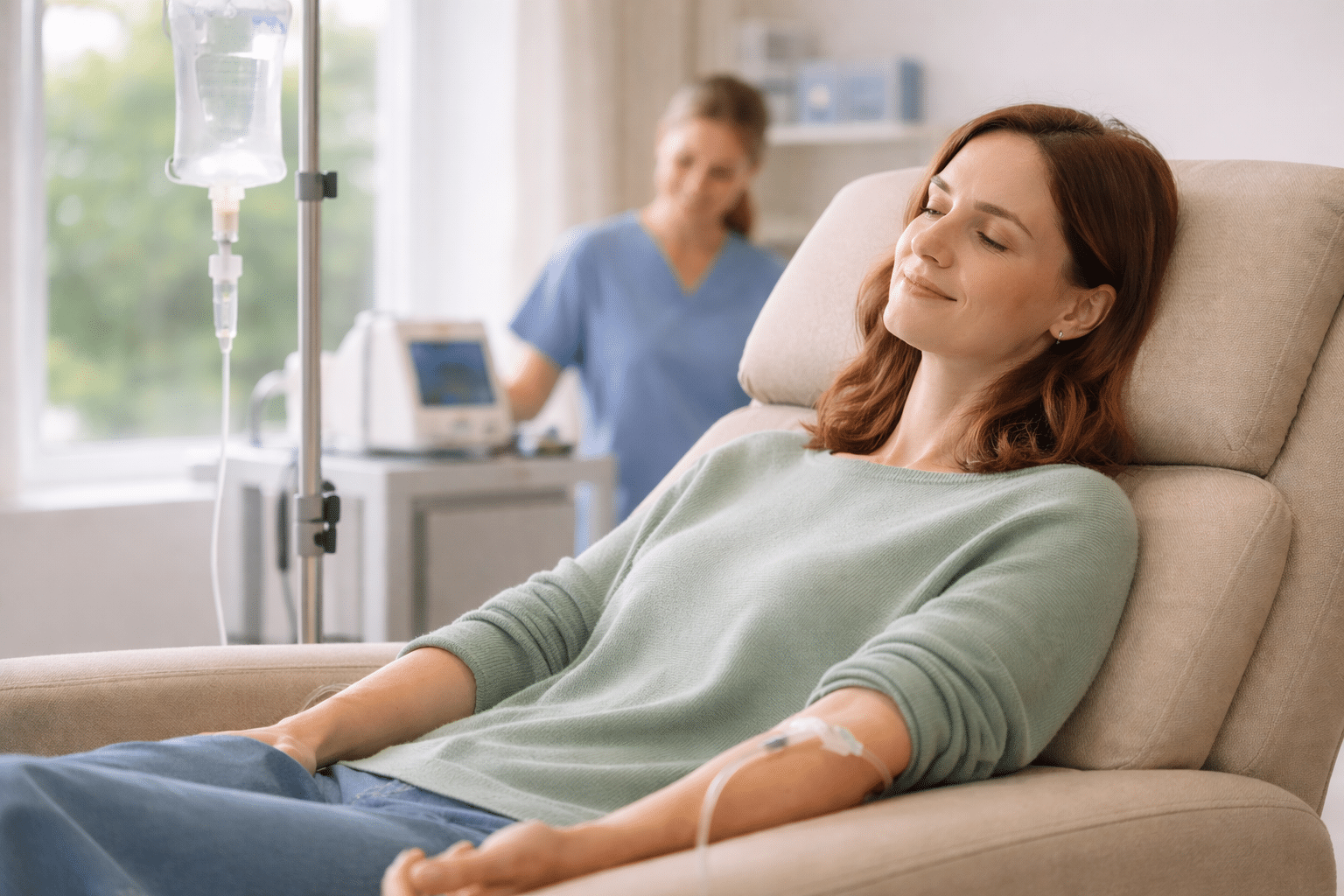A lot of people dealing with depression or anxiety try to “push through” their symptoms for months. The slide is usually slow enough that it almost feels normal.
National data makes that pattern clearer: More than 59 million U.S. adults experience mental health symptoms each year, yet only about half receive any treatment at all. When care comes late, symptoms have time to build, and crisis services start becoming the only safety valve.
Outpatient therapy gives people a different route. Regular sessions, whether it’s skills-focused cognitive behavioral therapy, supportive psychotherapy, or simple weekly check-ins, help someone steady themselves long before things become unmanageable.
The idea here isn’t just “talking.” It’s giving people room to understand what’s happening inside and catching the drift toward crisis early enough that hospitalization never becomes the next step.
Why Mental Health Symptoms Escalate Without Early Support
Most people don’t recognize early symptoms as something treatable. It starts with sleep slipping, or motivation thinning out, or a quiet sense of dread that shows up in small moments. A person might tell themselves it’s temporary. This is exactly how things escalate, as symptoms blend into routine.
For example, someone living with untreated anxiety often starts avoiding situations that make them feel overwhelmed. Avoidance brings relief, but only for a moment. Over time, avoidance makes the anxiety stronger. Without early anxiety treatment, it’s easy to slide into panic episodes or shutdown moments that feel severe enough to warrant emergency care.
Depression works in a slightly different way. Someone may begin withdrawing socially or lose interest in their normal rhythm. Without timely depression treatment, they can drift into deep exhaustion, more isolation, and sometimes suicidal thinking. At that point, an ER visit may feel like the only option.
National emergency department data reflects that pattern. Mental-health and substance-related concerns now account for over 12% of all adult ER visits in the U.S. A lot of those visits could be avoided if people had earlier access to steady outpatient care.
How Outpatient Therapy Stabilizes Symptoms Before Crisis
Once someone begins outpatient support, everything slows down enough to understand what’s happening. A weekly appointment, whether traditional therapy near you or structured psychotherapy, creates a consistent space to track symptoms and make small changes that eventually compound.
Cognitive Behavioral Therapy (CBT) is especially effective. Clinical reviews describe it as a gold-standard approach for anxiety disorders because it helps people challenge fear-based thoughts and reduce avoidance behaviors. It also works well for depression. Many people experience sizeable improvements as they learn how their routines, thoughts, and habits influence mood.
A lot of this feels subtle at first. An adjustment to a sleep pattern, or a new way of responding to negative thoughts, but these small shifts often keep symptoms from getting large enough to trigger crisis care.
The Long-Term Protection: Staying in Psychotherapy Reduces Relapse and Crisis Risk
A surprising amount of risk comes not from the first episode of depression or anxiety, but from what happens after someone starts feeling better. People often reduce therapy too quickly, thinking the worst is behind them. Research shows the opposite has more truth to it.
A 2022 meta-analysis reviewing outpatient CBT for major depression found that people who stayed in treatment had significantly lower relapse rates over the next 1–2 years compared to those receiving usual care alone. When researchers looked at mindfulness-based CBT programs for individuals with recurrent depression, the benefits lasted even longer. Many participants had fewer depressive episodes for months or even years, especially if they had experienced multiple episodes in the past.
This becomes clearer when thinking about how relapse works. Symptoms don’t usually crash in all at once. They creep. When someone stays connected to their therapist, they catch early warning signs: trouble concentrating, irritability, or emotional numbness. Those are the moments when outpatient psychotherapy services near you can help prevent a deeper spiral.
When Symptoms Worsen: How Intensive Outpatient Care Reduces ER Visits and Readmissions
After a traumatic event, a change in medication, or a big change in life, symptoms can sometimes get worse very quickly. Intensive outpatient programs (IOPs) are important at this point. They sit between weekly therapy and inpatient hospitalization, offering several structured hours of support each week without removing someone from home or work.
Real-world U.S. data shows how powerful this step can be. One youth-focused remote IOP program tracked participants who had visited a psychiatric emergency department shortly before enrolling. In the months after completing the program, about 94% did not return to the ER for another mental-health crisis.
Another behavioral health program for adults reported dramatic improvements too: roughly an 84% reduction in hospital admissions and a similar drop in readmissions among participants. Those numbers show what happens when people get the level of support that matches their symptoms. Instead of crisis care, they get guidance, structure, and tools.
Without a step-up option like an IOP, many people end up cycling in and out of emergency rooms. The right outpatient structure interrupts that cycle.
The Role of Follow-Up and Integrated Care in Preventing Hospitalization
There’s another side to prevention: what happens right after someone leaves a hospital or intensive program.
Researchers looking at Medicaid-insured youth found something striking. Those who received an outpatient mental health visit within 7 days of their psychiatric hospitalization had a 56% lower risk of suicide in the months that followed. One visit. One week. That early reconnection changed the trajectory.
Integrated care models show a similar pattern from the primary-care side. When therapy, psychiatric support, and medical care are coordinated together instead of operating separately, symptoms are caught earlier. A provider might notice subtle sleep disruption, rising irritability, or social withdrawal and adjust the plan quickly. Without that connection, those small shifts can deepen into another crisis.
A Steady Path Back to Balance
Outpatient mental health care is built on one simple idea: meet people early, and meet them consistently. Regular psychotherapy, structured cognitive behavioral therapy, and reliable access to depression or anxiety treatment help people stay grounded before symptoms gather force. Hospitalization becomes far less likely when someone has the tools and support to catch changes early.
If you’ve noticed your symptoms shifting or if you want steadier support through your week, we can help. At Zeam, we offer therapy, psychiatric evaluations, and personalized treatment plans designed to meet you before things escalate. Reach out to our team whenever you’re ready to begin care.
Key Takeaways (with citations)
1. Most people experiencing mental health symptoms never receive early treatment, increasing crisis risk.
More than 59 million U.S. adults experience mental illness each year, yet only about half receive care—allowing symptoms to escalate toward emergency services.
🔗 https://www.nimh.nih.gov/health/statistics/mental-illness
🔗 https://www.cdc.gov/nchs/data/nhsr/nhsr181.pdf
2. Outpatient therapy, especially CBT, helps stabilize symptoms before they become severe.
Clinical evidence shows cognitive behavioral therapy reduces anxiety and depressive symptoms and lowers relapse risk when continued over time.
🔗 https://journals.lww.com/ebp/citation/2022/07000/does_cognitive_behavioral_therapy_reduce_the.15.aspx
🔗 https://pmc.ncbi.nlm.nih.gov/articles/PMC10667974/
3. Intensive outpatient programs dramatically reduce emergency department visits and hospital readmissions.
U.S. program data show reductions of 84% or more in psychiatric hospitalizations and over 90% of youth avoiding ER return after IOP participation.
🔗 https://www.louisianahealthconnect.com/newsroom/intensive-outpatient-pilot-yields-double-digit-reduction-in-hosp.html
🔗 https://jamanetwork.com/journals/jamanetworkopen/fullarticle/2769145
4. Follow-up outpatient care after hospitalization significantly lowers suicide and relapse risk.
Receiving outpatient mental health care within 7 days of discharge decreases suicide risk and improves recovery outcomes.
🔗 https://jamanetwork.com/journals/jamanetworkopen/fullarticle/2769145




